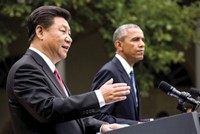Advertisement
Grab your lab coat. Let's get started
Welcome!
Welcome!
Create an account below to get 6 C&EN articles per month, receive newsletters and more - all free.
It seems this is your first time logging in online. Please enter the following information to continue.
As an ACS member you automatically get access to this site. All we need is few more details to create your reading experience.
Not you? Sign in with a different account.
Not you? Sign in with a different account.
ERROR 1
ERROR 1
ERROR 2
ERROR 2
ERROR 2
ERROR 2
ERROR 2
Password and Confirm password must match.
If you have an ACS member number, please enter it here so we can link this account to your membership. (optional)
ERROR 2
ACS values your privacy. By submitting your information, you are gaining access to C&EN and subscribing to our weekly newsletter. We use the information you provide to make your reading experience better, and we will never sell your data to third party members.
Environment
Progress, But No Breakthroughs
Climate-Change Summit: U.S., China endorse Copenhagen talks
by Cheryl Hogue
September 28, 2009
| A version of this story appeared in
Volume 87, Issue 39

All eyes were on the leaders of the world’s largest emitters of greenhouse gases at last week’s United Nations Summit on Climate Change. The presidents of China and the U.S., the two countries that together are responsible for about half of the world’s carbon dioxide emissions, voiced support for a new climate-change treaty.
But the presidents stopped short of specific proposals that could break an impasse in talks on that accord. Those negotiations are supposed to come to completion in December at a meeting in Copenhagen. The talks, however, are stymied over whether major developing countries should take on binding emission controls and over the level of financing the industrialized world should provide to help all developing nations adopt greener energy technologies.
Chinese President Hu Jintao offered the most substantial plan of action. He pledged that China will ratchet down its emissions of CO2 per unit of gross domestic product—a measure called CO2 intensity. By 2020, China will cut its CO2 intensity “by a notable margin” when compared with 2005 levels, Hu pledged.
To meet this goal, China will develop nuclear and renewable energy sources, Hu said, so that they supply 15% of the country’s energy consumption by 2020.
Even with this effort, however, China’s gross CO2 output is expected to rise as the world’s most populous country continues to develop rapidly.
Nonetheless, Hu’s announcement “is significant and shows China’s seriousness about acting on climate change,” says Jennifer Morgan, climate program director for the think tank World Resources Institute.
President Barack Obama reaffirmed the U.S.’s commitment to tackling climate change and called for countries to be “flexible and pragmatic” in the Copenhagen talks. Negotiations could remain tough, he suggested. “It’s a journey that will require each of us to persevere through setbacks and fight for every inch of progress, even when it comes in fits and starts,” he said.
Also at the summit, Mohamed Nasheed, president of the Maldives, a nation of low-lying atolls in the Indian Ocean, made an impassioned plea for the world to finish a new climate treaty. Noting that his country faces obliteration if sea levels rise because of global warming, Nasheed said: “We cannot make Copenhagen a pact for suicide.”







Join the conversation
Contact the reporter
Submit a Letter to the Editor for publication
Engage with us on Twitter